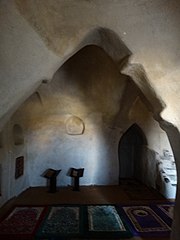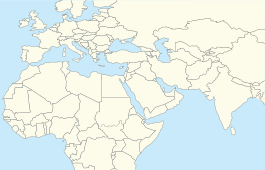Al Bidya Mosque
| Al-Bidya Mosque The Ottoman Mosque[1] | |
|---|---|
Masjid Al-Bidyah (مَسْجِد ٱلْبِدْيَة) Masjid Al-Bidiyah (مَسْجِد ٱلْبِدِيَة) Masjid Al-Badiyah (مَسْجِد ٱلْبَدِيَة) | |
 | |
| Religion | |
| Affiliation | Islam |
| Branch/tradition | Sunni |
| Location | |
| Location | Al-Bidiyah, |
| Geographic coordinates | 25°26′20.65″N 56°21′14.08″E / 25.4390694°N 56.3539111°E |
| Architecture | |
| Type | Mosque |
| Date established | 15th century C.E. |
| Specifications | |
| Dome(s) | 4 |
| Minaret(s) | 0 |
Al-Bidya Mosque (Gulf Arabic: مَسْجِد ٱلْبِدْيَة, romanized: Masjid Al-Bidyah, sometimes transliterated as Al-Bidiyah (ٱلْبِدِيَة) or Al-Badiyah (ٱلْبَدِيَة)) is a historical mosque in the Emirate of Fujairah, the U.A.E. It was the oldest known mosque in the country,[2] prior to the discovery in September 2018 of the ruins of a 1000-year-old mosque dating back to the Islamic Golden Age, near the Sheikh Khalifa Bin Zayed Al Nahyan Mosque in the city of Al Ain, Emirate of Abu Dhabi.[3][4] Still in use, it is located in the small village of Al-Badiyah or Al-Bidiyah, about 40 km (25 mi) north of the Emirate's capital city,[5] and is also known as the "Ottoman Mosque".[1][6]
History[edit]
The mosque's date of construction is uncertain[1] and because the mud and stone built structure uses no wood, radiocarbon dating is not possible. It is estimated to date to the 15th century C.E.,[7] however some much earlier estimates have been proposed. The site was investigated by the archaeological center of Fujairah in co-operation with the University of Sydney from 1997-98.[5] and Fujairah Archaeology and Heritage Department concluded that the mosque was believed to be built in 1446 AD, along with the two watch towers overlooking the mosque and the village.[1]
Structure[edit]

The small, square structure has an area of 53 square metres (570 sq ft) and was built from materials available in the area, primarily stones of various sizes and mud bricks coated in many layers of whitewashed plaster. The roof has four squats, helical domes that are supported by only one centrally placed pillar that also forms the ceiling. Entrance to the mosque is through double-winged wooden doors.[5]
The prayer hall has a small mihrab (the niche in the wall that indicates the direction of Mecca), a simple pulpit, arches, and openings. A central pillar divides the internal space into four squares of similar dimensions. The pillar supports all four domes that can be seen from the exterior.[6]
Inside the prayer hall, a number of small decorative windows allow light and air to enter the mosque. There are also cube-shaped spaces carved into the thick walls where copies of the Quran and other books are stored.[8]
The mosque continues to host daily prayers, and is a tourist attraction.[5]
See also[edit]
References[edit]
- ^ a b c d "Designs on the past". Gulf News. December 10, 2001. Retrieved August 1, 2011.
- ^ "Bidya oldest known mosque in Fujairah or UAE". Gulf News. August 6, 2009. Retrieved August 1, 2011.
- ^ "Remains of 1,000-year-old mosque reveal a rich past". The National. Emirates 24/7. 2018-09-10. Retrieved 2018-10-10.
- ^ Power, Timothy (2018-09-13). "How a 1,000-year-old mosque in Al Ain anchors the UAE in human history". The National. Retrieved 2018-10-10.
- ^ a b c d "The oldest mosque in the country". The National. December 4, 2010. Retrieved April 18, 2011.
- ^ a b "11 Top-Rated Tourist Attractions in Fujairah". www.planetware.com.
- ^ Eugene Harnan. "Oldest UAE mosque holds onto its secrets". The National.
- ^ "History comes alive". Gulf News. July 10, 2008. Retrieved July 30, 2018.
External links[edit]
 Media related to Al Bidyah Mosque at Wikimedia Commons
Media related to Al Bidyah Mosque at Wikimedia Commons- Video: The Imam of Al Bidya mosque (The National)
- Al Bidya Mosque in Fujairah | Gulf Roundup 1 Jan 2016 (Asianet News)
- 500 year old Mosque in UAE (YouTube)
- 570 Year old Mosque in UAE | Al Badiyah Mosque | Life and Travel | Malayalam Travel Vlog #05




